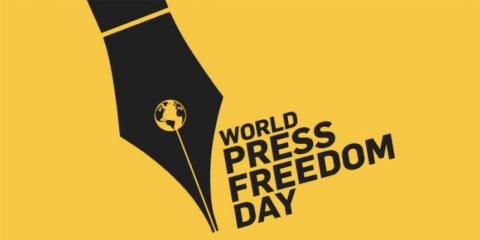
On May 3, World Press Freedom Day, journalists across the globe honored the power of truth and integrity in their work. This day holds an even deeper meaning for health journalists working in malaria-endemic countries—a fervent hope that future generations will live in a world free from malaria.
Advocating for Change
For Racheal Abujah, a health journalist with The News Agency of Nigeria, this hope drives her work. Racheal's world shifted the day she set foot on a farm in northern Nigeria and stumbled upon a sight that shocked her. Instead of using mosquito nets to protect people from malaria, the farmers used them to shield their crops from pests, leaving the communities vulnerable to the disease's relentless grip.
This revelation was a harsh reminder of the challenges facing women and girls, in particular, who often face higher risks of infection and barriers to accessing health information and services. The fight against malaria must be intertwined with efforts to support vulnerable groups and break the cycle of poverty and illness.
Racheal's reporting in the rural Chika-Aleita Community set a wave of change in motion. Her coverage of the community's plight sparked clean-up campaigns, mosquito net distributions, and educational initiatives on malaria prevention. It showcased the indispensable role of a free press in safeguarding lives and amplifying the voices of those who are often silenced.
Malaria's Human Cost and Solutions
Evelyne Musambi, a health journalist with the Associated Press sheds light on the devastating impact of malaria through her recent work in a recent aricle. Her reporting paints a poignant picture, particularly through the story of Rosebella Awuor, who tragically lost her life and unborn child to the disease. This serves as a somber reminder of the 10,000 maternal deaths each year caused by malaria during pregnancy.
Musambi's work exposes the human toll of this preventable illness and highlights innovative solutions, such as the local production of antimalarial medication. Her coverage brings much-needed attention to the urgent need for more effective measures to combat malaria and save lives.
Musambi's personal experience with malaria fuels her dedication to reporting on the topic. "Seeing the disease still taking lives drives me to stay informed on treatments and prevention methods to raise awareness and prevent these avoidable deaths," she shares. Musambi's work is crucial in raising awareness and driving progress in the fight against malaria.
In Southern Africa, health and climate journalist Melody Chironda from All Africa who recently sat down with RBM Partnership CEO Dr. Michael Adekunle Charles to discuss the ongoing battle against malaria in Africa. Despite significant progress, eradicating the disease remains a top priority. For Melody, this fight is personal; she finds purpose in reporting on malaria and other climate-linked health threats, as her work can raise awareness, influence policy, and save lives. The continuous vaccine discoveries in this field keep her inspired and sharing these stories not only empowers the public but also gives a voice to vulnerable communities in the region.
On World Press Freedom Day, we celebrate the courage and dedication of journalists who work tirelessly to bring attention to the fight against malaria. Their efforts expose the devastating human cost of the disease and shine a light on innovative solutions that offer hope for a malaria-free future. From Racheal Abujah's impactful reporting in Nigeria to Evelyne Musambi's poignant stories from Kenya and Melody Chironda's insights in Southern Africa, these journalists play a crucial role in raising awareness and driving progress. By sharing the voices of the most vulnerable and highlighting the urgent need for change, they inspire global action and bring us closer to a world without malaria.